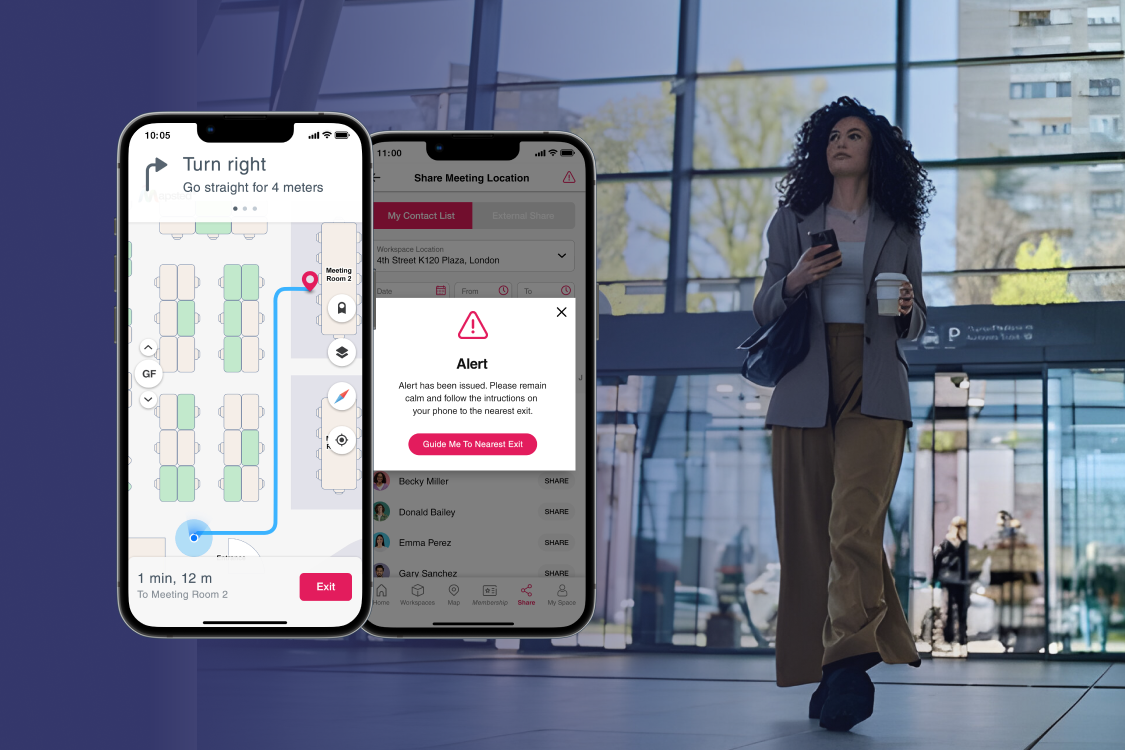Technology Trends

The smart building landscape is constantly transforming, due to the incorporation of advanced technologies which automate processes and create environments that are dynamic as well as responsive. These smart building technologies are not just an addition, they act as foundational elements within any smart building ecosystem by providing real-time information that improves operational efficiency, safety levels and user experiences. As buildings shift from being static structures into adaptive systems with artificial intelligence (AI), one can expect that intelligent systems and location services will become central in enabling this change.
In this blog we undertake a comprehensive exploration into the importance of location services in smart buildings, their applications across different sectors and benefits they offer.
Understanding Location Services in Smart Buildings
Location services in smart buildings refer to the use of technologies such as Bluetooth Low Energy (BLE), Wi-Fi, Ultra-Wideband (UWB) and others to monitor and manage assets, people and environmental conditions within a building. Real time data is collected by these technologies as they transmit it after analysis aimed at optimizing operations within the building while at the same time improving safety standards plus overall user satisfaction.


Unlike traditional building management systems which were based on proximity alone, location–based services allow more precise control and visibility over resources. This helps building managers make informed, error-free decisions based on precise data instead of guesswork. This capability is particularly valuable in environments where safety, efficiency and responsiveness are paramount. Let’s take a look at some of the use cases of location based services in smart buildings.
Use Cases of Location Services in Smart Buildings
1. Optimizing Office Spaces for Efficiency and Collaboration
Location services have become indispensable tools for space utilization optimization and fostering collaboration in modern office setups. By tracking the occupancy of meeting rooms, workstations and communal areas, these systems provide valuable insights into how spaces are being used. Such data can be used to make decisions about how to allocate space, or design it.
For instance, during the COVID-19 pandemic period, location-based services helped maintain social distancing protocols where facility managers could easily monitor real-time occupancy levels so overcrowding could be avoided while enabling contact tracing through monitoring movements made by people within a building.
2. Enhancing Operational Efficiency in Warehousing and Manufacturing
When it comes to asset tracking and workflow optimization location services are widely used within the logistics industry especially warehousing management functions. Inaccurate identification of machinery or personnel positions may lead to prolonged downtimes thus reducing productivity levels hence precisely locating pallets, machines and staff locations is critical in such environments.
Safety management also heavily relies on location based services since heavy equipment like forklifts need continuous monitoring, thereby ensuring that there are no objects within their operational range which might cause collisions or enter restricted areas.
3. Streamlining Healthcare Operations and Improving Patient Safety
In the healthcare industry, location services are revolutionizing the game. To this end, hospitals and nursing homes can make use of these technologies to keep track of where precise medical tools, patient beds or even health workers are at any given time. This not only improves operational efficiency but also enhances patient care.
For instance, hospitals could save lives by ensuring that ventilators or crash carts are present when needed through real-time equipment location. Furthermore, these systems may prevent falls, a frequent and expensive problem within healthcare premises – by monitoring patients movements.
A case study from St. Claire Health showed how integrating location services helped in optimizing operations, space utilization and improving patient care. This led to better treatment, as it took less time to locate critical medical equipment.
4. Revolutionizing Retail Experiences with Precision Tracking
In retail environments, getting customer preferences and behaviour right is crucial. Optimizing store layouts and improving product placement can lead to increased sales. Location services can provide shopper movement data through the store revealing popular areas and paths.
For example, in a large shopping mall, location services can generate heat maps that show which parts of a store are frequented most often, thus allowing retailers to stock those areas with high-demand products. Also, monitoring queue lengths and directing staff to busy areas in real-time can reduce wait times at checkouts, improving the shopper experience.
5. Ensuring Security and Enhancing Visitor Experiences in Public Spaces
Public spaces such as museums, stadiums and airports can greatly benefit from location services. By precisely monitoring visitor movements, security can be improved, crowds can be managed, and the overall visitor experience can be elevated.
Museums can use location services that provide interactive guided tours which adjust based on visitor location, offering a more immersive experience. Similarly, airports can use these systems to help passengers easily navigate to gates, washrooms, baggage claim and other amenities.
In the museum industry, one use case of location based services is The Strong Museum of Play, which deployed innovative, hardware-free hardware-free blue-dot navigation location services to improve visitor engagement. Apart from making visitors have richer experiences, it also helped the museum manage guest flow more efficiently, ensuring a smooth and enjoyable visit for all.
The Tangible Benefits of Location Services in Smart Buildings
There are a wide range of benefits of location services in smart buildings, which transform them from static structures into dynamic, adaptive environments. Some of the key benefits are:
- Enhanced Operational Efficiency: By providing real-time data on the location and usage of assets, personnel and spaces, location services help streamline operations, reduce waste and increase productivity.
- Improved Safety and Security: Location services allow continuous monitoring of movements within a building, helping in the early detection of potential risks and quick response to security threats.
- Better Space Utilization: Understanding how spaces are used allows managers to optimize layouts and allocate resources better, thus cutting down costs while enhancing user experiences.
- Personalized User Experiences: Buildings can respond to occupant needs dynamically through location-based services that adjust lighting levels, temperature and many other things to create a more comfortable and personalized environment.
- Sustainability and Cost Savings: By optimizing the use of resources such as energy and water, location services help reduce the environmental footprint of buildings while also lowering operational costs.
Conclusion: The Future of Smart Buildings Lies in Location Services
As the smart building market continues to expand, by 2030 industry experts expect spending on location services will hit $176.9 Billion, showing how crucial they are. It is not about just improving efficiency or safety, it is about creating spaces that truly care for the needs of their occupants.
The future of real estate, healthcare, retail and public spaces will be defined by how well these environments can adapt to changing needs and location services are the key to unlocking this potential. Want to lead in the smart building space? Book a free demo with Mapsted. If you found this blog helpful, don’t miss our other post on 7 Emerging Trends Transforming the Location-Based Services Market or watch our video on Mapsted’s Location Technology Solutions to learn more.
Frequently Asked Questions
Q1. What are the main advantages of location services in smart buildings?
Ans. Location services have many benefits in smart buildings, such as better operational efficiency, increased safety and security, improved space utilization, personalized user experiences and large cost savings through resource optimization.
Q2. How do location services improve safety in healthcare facilities?
Ans. In healthcare, location services real-time information is used to know where medical devices, patients or staff are at any given time which allows them to respond quickly during emergencies, reduce patient falls and make sure necessary supplies are available when needed most.
Q3. Can location services improve customer experiences in retail spaces?
Ans. Yes, retail spaces can use location services to monitor customer movements so they can optimize store layouts, decrease checkout times and offer specific promotions that lead to a more personalized and efficient shopping experience.
